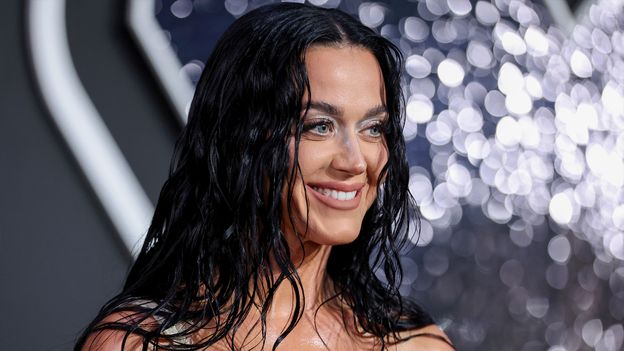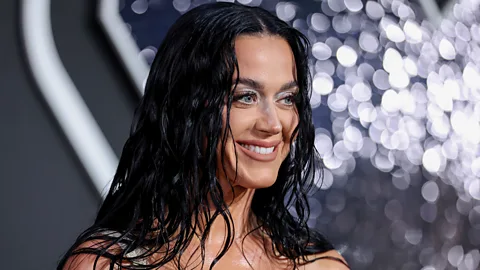 Getty Images
Getty ImagesShe was one of the world’s biggest pop stars – but her new album has been plagued by controversy and failed singles. Here’s why she’s stumbled – and what it says about music today.
The comeback has a special place in pop culture. From Judy Garland’s career-reviving 1961 concert at Carnegie Hall to Cher’s reinvention as a chart-topping dance diva with 1998’s Believe, it’s a story that never loses its emotional piquancy. There’s something moving and even comforting about seeing a great star return to the top, particularly because it doesn’t happen every time. For this reason, the narrative’s sad flipside – the failed comeback – is every bit as fascinating. It reminds us that to miss the target is fundamentally human and that nothing in life is guaranteed.
This is the prevailing wind that Katy Perry faces today as she releases her seventh album, 143. Its controversial lead single Woman’s World stalled at number 63 on the Billboard Hot 100 and number 65 in the UK when it arrived in July, while its more anodyne follow-up, Lifetimes, had to settle for a number 15 placing on the less prestigious Billboard Bubbling Under Hot 100. These are crushing results for an artist who has more diamond singles denoting US sales of 10 million units – six – than any female artist bar Rihanna. “Katy Perry is one of the biggest names in pop music, so when these songs didn’t cut through, it created an interesting story for the media,” says Hugh McIntyre, a music journalist with Forbes. And that story is: Why is her new music not connecting with the public?
The problems all began with the Woman’s World rollout in July. Two months after its release, it’s difficult to regard the song as anything other than dead on arrival. In an Apple Music 1 interview, Perry said she wanted it to reflect her “feminine divine” and feel “empowering” in a similar way to her signature hits Firework (2010) and Roar (2013). When she sings “it’s a woman’s world and you’re lucky to be living in it,” it’s a characteristically plainspoken expression of that message. Perry shrewdly acknowledged in the interview that people associate her with “songs that are captions on T-shirts and stuff like that”.
A message gone wrong
However, many fans and critics felt that Perry’s feminist message was fatally undermined by her choice of collaborator – producer Lukasz Gottwald, better known as Dr Luke. Perry worked extensively with Dr Luke on her three most successful albums – 2008’s One of the Boys, 2010’s Teenage Dream and 2013’s Prism – but he was absent from her subsequent albums, 2017’s Witness and 2020’s Smile. Both of these were written and released within the timeframe of his lengthy legal battle with pop singer Kesha. Though Perry has never commented in a press interview on her decision to sever ties with Dr Luke, she said during a 2017 deposition that she chose not to work with him on Witness because she didn’t want to appear to be “taking a side”.
At the time, their legal battle was still sending shockwaves through the music industry. In October 2014, Kesha had filed a lawsuit against Dr Luke claiming he had drugged and raped her on two occasions in addition to “sexually, physically, verbally and emotionally” abusing her. Dr Luke countersued Kesha for defamation and said she had fabricated claims to extricate herself from a recording contract. In February 2020, a judge ruled that Kesha had defamed Dr Luke when she claimed in a text to Lady Gaga that the producer had raped Perry; the producer denied this allegation and Perry said it was “absolutely not” true during her deposition. Kesha and Dr Luke’s extended dispute was eventually settled in June 2023 when both parties posted a statement saying they had “agreed to a resolution”.
However, Dr Luke’s name remains controversial, even as some industry gatekeepers have welcomed him back into the fold – since 2021, he has picked up multiple Grammy nominations for his work with pop-rap star Doja Cat. Music journalist Rhian Daly believes that Perry “really misjudged how working with Dr Luke again would go down”. Though Daly acknowledges that Perry is “not the first artist to collaborate with Dr Luke since Kesha’s legal battle”, she also notes that Doja Cat in particular has since distanced herself from him. In 2021, the rapper and singer told Rolling Stone that there is music of hers “that he’s credited for, where I’m like, ‘Hmm, I don’t know, I don’t know if you did anything on that'”. She also said: “I don’t think I need to work with him again.” By contrast, a representative from Perry’s label told Rolling Stone in June that “Katy knew exactly the album she wanted to make and put together the team to make it happen”.
As a result, Perry launched her 143 album campaign under a fog of controversy; many fans found it confusing at best that she would craft a song about female empowerment with a man who has been publicly accused of abuse by a woman – albeit that the complaint was dropped and never went to a court. The song’s lyrics were also called into question. In her songwriting, Perry has always favoured mass appeal over sophistication – her 2010 hit Firework features the couplet: “Boom, boom, boom / Even brighter than the moon, moon, moon.” But even so, the lyrics of Woman’s World feel reductive, particularly given the huge issues of womanhood and gender equality she is writing about. “She’s a winner, champion, superhuman, number one,” Perry sings on the pre-chorus.
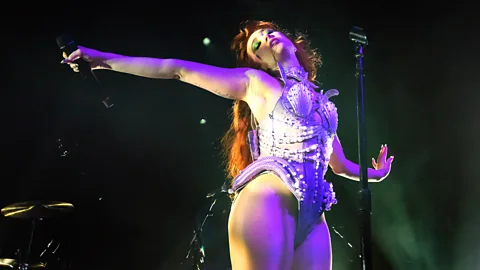 Getty Images
Getty ImagesThough well-meaning, this rather monolithic vision of feminine excellence might have resonated better a decade ago when the expression “girlboss” still felt fresh. Music journalist Amy Davidson says that in the current climate, fans “won’t stand for tokenistic attempts at entering the conversation”. She points out that two of 2024’s most talked-about artists, Charli XCX and Chappell Roan, have “blazed trails” by writing with scorching authenticity. XCX’s recent hit Girl So Confusing, for example, explores the messy complexity of female friendships with such matter-of-fact lyrics as: “Sometimes I think you might hate me / Sometimes I think I might hate you / Maybe you just wanna be me.” Meanwhile, democratic presidential nominee Kamala Harris has used Roan’s spiky and direct call-to-arms Femininomenon in a TikTok campaign video – something Perry could feasibly have imagined Woman’s World being deployed for.
Meanwhile, Perry’s accompanying music video for the song only added fuel to her detractors’ fire. Scenes in which she channelled World War Two icon Rosie the Riveter and portrayed a bikini-clad bionic woman were perceived by some to be pandering to the male gaze. Perry responded to this criticism by seemingly claiming that the visuals were intended to send up the male gaze. “You can do anything! Even satire!” she posted on X alongside a clip from the video.
This defensive approach was a far cry from the confidence with which she announced her new album 143 on the same day as Woman’s World dropped. In a press release, the LP was trumpeted as “a sexy, fearless return to form for the multifaceted musician” that is “jam packed with the empowering, sexy and provocative pop anthems you’ve come to love”. The subtext was easy to decipher: Perry was aiming to regain the cultural domination of her late 2000s and early 2010s imperial phase.
Her glory days
Home to the sleekly cheeky hits I Kissed a Girl and Hot n Cold, Perry’s 2008 album One of the Boys – her second, but first on a major label – made her a global star. Then with 2010’s Teenage Dream LP, she went truly supernova. A bold, maximalist mix of pop, rock, hip-hop, dance and disco, it yielded five Billboard Hot 100 number one singles including California Gurls and the title track, matching a record set by Michael Jackson’s 1987 album Bad. During this era, Perry displayed her ability to ride the zeitgeist while mining multi-generational nostalgia by filling her Last Friday Night (T.G.I.F.) music video with celebrity cameos ranging from then-recent viral star Rebecca Black to 1990s boyband Hanson and 1980s heartthrob Corey Feldman.
Released in 2013, Perry’s more mature fourth album Prism was less of a blockbuster success, but it did yield another two Billboard Hot 100 number ones: Roar and Dark Horse. The bottom only really fell out of her chart-topping era with 2017’s Witness LP. Perry described it as an album of “purposeful pop” written in the wake of the previous year’s highly polarised presidential election, but this message was undercut by second single Bon Appétit. Filled with crass food-as-sex metaphors, it stalled at number 37 in the UK and number 59 in the US. Though her subsequent album, 2020’s Smile, was trailed by the genuinely brilliant electro banger Never Really Over, it failed to return Perry to the top of the charts.
Still, it is worth noting that Perry remained a power player even when her stock had apparently fallen: in 2018, Forbes named her the highest-paid woman in music after she pocketed $83 million thanks to a successful tour and her new judging role on American Idol. The singer has kept her profile up by appearing on the TV singing contest ever since, but she announced in February that the current season will be her last: a sure sign she wants to remind people that she is a pop star first. Sadly, neither Woman’s World or its follow-up singles have quite restored her lustre. Lifetimes, a house-flavoured celebration of maternal love, and I’m His, He’s Mine, a collaboration with rising star Doechii built around a chunky sample from Crystal Waters’ 1991 club classic Gypsy Woman, both missed the Billboard Hot 100 entirely. And she’s run into further troubles with her visuals as well: in August, it was reported that she was under investigation by Spanish officials for allegedly filming the Lifetimes music video in an ecologically sensitive part of the Balearics without permission. A spokesperson for Perry’s label said the production company responsible for the video had “assured us all necessary permits for the video were secured”, but it added to the snowballing narrative that Perry’s album rollout has been uncommonly messy.
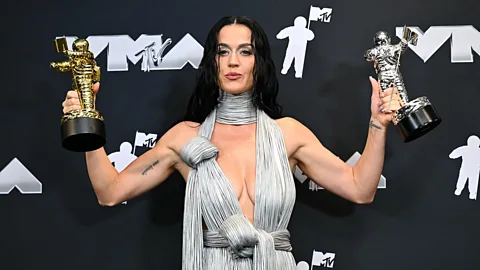 Getty Images
Getty ImagesMcIntyre believes these singles sound “kind of dated” because Perry has failed to move with the times. “It feels like she’s trying to engineer a pop song that everyone will like – from 12-year-old kids to their 40-year-old parents,” he says. Perry may have perfected this formula during her Teenage Dream era, but McIntyre questions whether it is possible to write songs with “such widespread appeal” in 2024, when the media is “much more fractured”. While many Gen X and millennial music fans are still avid radio listeners, consumers from Gen Z and the age group below, Gen Alpha, are probably more likely to discover a song through apps such as TikTok and Spotify.
Daly also believes that Perry has struggled to adjust to a very different cultural climate. “Back in 2014, there was a real sense of hope and her bright, bubbly pop matched the mood,” she says. “But now, after a global pandemic, years of austerity, and ongoing wars and injustices, it’s quite the opposite.” Daly argues that Perry’s new music just doesn’t fit into a prevailing worldview that is “more apathetic, nihilistic and hedonistic”.
Is misogyny at play?
Perry’s comeback may also have been hampered by a toxic combination of misogyny and ageism that tends to affect female artists over 35: Perry is now 39. This problem was spotlighted in August 2023 when Kylie Minogue’s viral hit Padam Padam was seemingly snubbed by several youth-oriented UK radio stations and the song’s producer, Peter Rycroft, claimed this was “essentially because [Minogue] is an older woman”. Daly argues that “age is definitely a factor in the reaction to Perry’s return, whether her critics would admit that or not”. She notes that high-profile female artists “often face a backlash when they reach a certain age and audiences decide they’re ‘trying too hard’ to remain relevant or youthful”.
With Perry’s new album 143 out today, it remains to be seen whether she can salvage a campaign clouded by negativity. At the same time, it would be foolish to write off Perry, a grafter who has form when it comes to going back to the drawing board. She launched her career in 2001 as the wholesome Christian rock singer Katy Hudson, but when her eponymous debut album barely made a blip, she took stock and re-emerged several years later as the altogether more worldly performer Katy Perry.
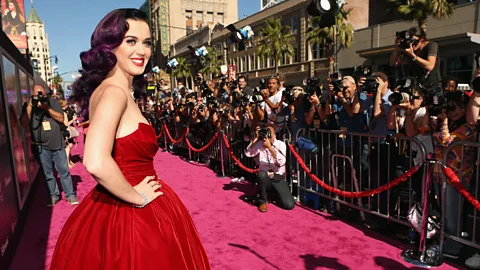 Getty Images
Getty ImagesShe has also displayed at least a partial willingness to acknowledge past mistakes. In the years since its release, her 2008 breakthrough hit I Kissed a Girl has been accused of reinforcing tired bisexual stereotypes with lines such as “hope my boyfriend don’t mind it”. Last year, Perry admitted she would “probably make an edit” if she were writing it now. Davidson suggests that if Perry were to take on board the criticisms aimed at Woman’s World, particularly with regard to its “half-baked” attempt to “jump on a feminist message that no longer feels relevant”, she could potentially “recalibrate and return with a pop banger that has no agenda other than being a pop banger”.
At present, it seems unlikely that she will address head-on the controversy surrounding her decision to re-team with Dr Luke. During a recent appearance on the Call Her Daddy podcast, Perry sidestepped a question about the “disappointment” and “upset” this has caused by reaffirming that she is the main creative driving force behind her new album. “The truth is I wrote these songs from my experience of my whole life going through this metamorphosis. And he was one of the people to help facilitate all that – one of the writers, one of the producers,” she said. But even so, if Perry can more generally dial up her propensity for self-reflection and make the necessary adjustments, perhaps with the plainspoken clarity she puts into her lyrics, she may get her comeback further down the line.

